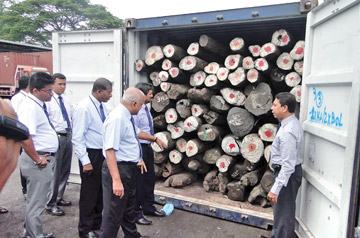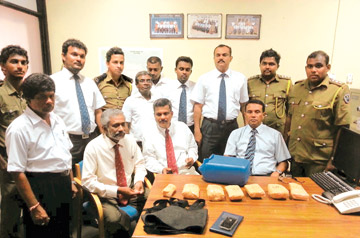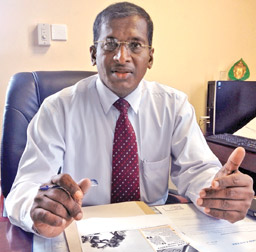|
Informant tip off pays:
Nabbing a spooky smuggler
By kurulu Kariyakarawana
A Customs official on duty at the Bandaranaike International Airport
on one busy weekday evening received an anonymous call on his mobile
phone. The caller who didn't divulge his name gave a description of a
passenger who would walk through the Customs gates at a scheduled time
concealing gold nuggets in his rectum. But before hanging up the caller
gave a four digit code, which was jotted down by the officer.
 |
| Customs
officials inspect an illegal rosewood consignment |
 |
| Seized gold
nuggets |
As warned by the anonymous caller the Customs official warmed up to
to receive the suspicious traveller who would enter the airport through
the Arrivals Gate. He informed his unit members and necessary action was
taken to seize the passenger upon arrival.
Making the warning a reality a man fitting the description given by
the caller entered through the Customs gates and was immediately taken
in for a random check-up. Within moments the agents realised that the
man was carrying concealed gold in his body.
Millions of rupees worth of gold nuggets were recovered from the
arriving passenger who tried to smuggle it into the country under the
nose of the Customs officials. If not for the timely tip off they would
have missed a golden opportunity to thwart a major smuggling attempt by
a daring passenger.
Itís not a secret how information or informants play a crucial role
nowadays in assisting fighting crime. Most of the major scale smuggling
of contraband in to the country would have gone unnoticed if it is not
for a correct piece of information at the right time. Therefore the
crime fighters have introduced various schemes of rewards to encourage
these informants, who would play a silent and secretive role.
The Sri Lanka Customs Department is an ideal example for this and
have detected a considerable number of major detections in the recent
history acting on information. Most of the cases were busted with solid
information received prior to the detection and it enabled the officials
act on time to round up the perpetrators. And itís not millions but
billions of rupees they have been paid for their valuable informants
assisted in identifying the criminals.
 |
|
Customs officials at the
Kankesanthurai Customs Unit seized the largest gold slab
consignment weighing over 250 kilograms worth billions of rupees
a few weeks ago. |
Explaining the situation Customs Spokesman Director Leslie Gamini
told the Sunday Observer that informants play a pivotal role in the
field in assisting the officials to control smuggling and various other
unlawful activities.
According to him there are two types of informants- anonymous and an
informant who reveals his identity. But both types are concerned about
the result of their valuable information and the reward being paid to
them following a successful detection.
There are many ways how an informant would approach an official to
pass his information. Those are either by sending a letter, by way of a
facsimile, an email, a SMS or through a telephone call. Sometimes they
would even meet an officer in person and tip him off about an unlawful
activity.
|

Customs Spokesman
Director Leslie Gamini |
It is the paramount duty of a law enforcement official to safeguard
his informant and his identity. Once information is received, for a
example through the telephone, it is important to check the genuineness
of that tip off. Some people for various reasons, perhaps to take
vengeance from a rival, would give wrong information just to put that
person in a difficult or an embarrassing situation.
Therefore, checking the veracity of the information is vital. For
this the officials calls back on the number they received the anonymous
call from and establish a trust that it was the right person. After
verifying the information by cross checking, they come to an
understanding with the informant that is how he would be recognised on a
future date to grant his reward, if the information leads to a
successful detection.
Usually informants give a code name, a number to identify them that
only the officer who would be contacted to give the information will
know the code name. The officer is not legally and ethically bound to
reveal the details or identity of his informant even in the most extreme
scenario. Once the details are received from an informant the officer
will fill a form stating the data including the particular code and will
seal it in an envelope. The envelope will then be handed over to his
immediate boss, who will keep it in a safe locker.
In some cases officials ask them to send one half in local currency
and the other half with the sender. Once the case is closed and the
rewards are to be paid, the informant is asked to come up with the half
of currency notes to match with the half previously sent to the
official. This is a fool proof system followed by many law enforcement
agents and not only the Customs.
Once the details of the informant are kept in a safe, the officer
will inform his superior about the information and immediate action will
be taken to commence an investigation.
The detections, arrests and seizures will then be made on the
information supplied by the caller.
When a successful detection is made the goods or the contraband will
be sold at a public auction depending on the types of goods. Narcotics,
weapons and other hazardous items will never be included in that
category. But goods like jewellery, gold and other goods will be sold
and the revenue will be earned. The seizure of goods into the custody is
called forfeit in the Customs vocabulary. Also a fine will be imposed on
the offenders and the revenue would be generated.
Fifty percent of the revenue generated will be given to the state,
whereas 60% of the remaining half will be paid to the informant.
Information will be categorised into three degrees according to the
Customs system. First Degree Information is considered where the most
accurate details of an offender is supplied to the officials. For a tip
off with incomplete details will be called a Second Degree Information
and mere information is considered Third Degree Information.
sixty percent of the remaining 50% of revenue will be paid to a
successful First Degree Information and the remaining 40% will be paid
to the officers who are investigating. 40% of the remaining 50% will be
paid to a Second Degree Information and 20% of the remaining 50% will be
paid to Third Degree Information and the remaining 80% will be divided
amongst the officials who were involved in the investigation, who did a
major role working on mere information.
Once everything is completed the informant will be informed that his
reward is ready to be claimed. According to the Customs law an informant
should be paid his reward with clean cash and no documents or cheques
involved in that. Also the reward is made only in the presence of two
officials, who are the Director General of Customs and the officer who
received the information. Before the payment of reward a bulk of cash
depending on the magnitude of the revenue earned from a case will be
brought to a secret location (maybe a place nominated by the informant)
by the Customs Shroff who is authorised to bring the money.
Once the money is placed the shroff will leave the premises leaving
room only for the three men. The
payment is then paid after carefully checking the
code verified by the informant or after producing the other half of
the currency note.
According to Director Gamini sometimes there are disputes when two
informants try to claim for a successful detection and the reward
following. There are even instances that the cases went up to a court of
law to ascertain the actual informant.
In a rare instance an informant requested his reward to be paid to
him at the Galle Face Green, where the Director General of Customs
obeyed the instructions and went there. Today supplying information for
law enforcement authorities has risen to a very high level where the
informants would do that for a job and pass time. Skilled and
specialised individuals would act initiate as private detectives and
will gather information related various international smuggling
syndicates.
They will then supply the information agencies expecting rewards.
This is the future of modern crime fighting methods and the
sophisticated role of informants as seen today.
Sri Lanka Customs Department request you to supply any valuable
information to their hotline 0112 471471 of the Central Intelligence
Directorate. |

